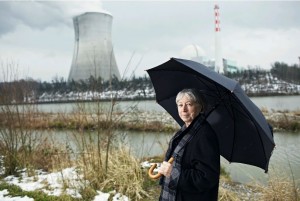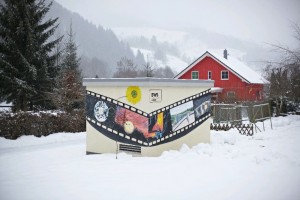
One mother’s dedication can make a difference.
Ursula Sladek was spurred into action after the Chernobyl disaster in 1986. A mother of five small children from Germany’s Black Forest region, Ursula was alarmed by the detected radiation in local produce and even on neighborhood playgrounds. Her concerns for her children’s health and the safety of their daily activities inspired her to seek out alternative sources of energy.
Germany was, and still is, largely dependent on nuclear energy. But, the good news is that the country just last month passed a law which will close all of their nuclear plants down by 2022.
Initially, Ursula focused on behavior-changing practices piloted within her own home, then spread the changes by educating her neighbors throughout the farmlands of Schoenau, a small town in Black Forest, Germany. Ursula recalls seeing her son turn off a light even with his cut finger before he was whisked away to the hospital for stitches after a run in with a kitchen knife. Conserving energy was ingrained into her children’s brains. Eventually, Ursula took her energy independence goals a step further and started installing solar panels on her own home and some others within her community. Ursula worked with her neighbors as a group to urge the local power company, KWR, to increase their renewable energy sources, but KWR wasn’t keen on the proposals and refused to budge.

So the group took matters into their own hands. They formed Schoenau Power Supply (EWS), and vied for the license to operate the power grid when KWR’s license went up for renewal in 1991. KWR requested an inflated price, but Sladek’s group raised the exorbitant purchasing cost and took the license in 1998. They even sued KWR for illegal price fixing, after the fact.
Today, Schoenau Power Supply is collectively owned by 1000 citizens. Schoenau’s energy sources are 100% green, primarily hydropower, but also sourced from solar panels, wind turbines, and co-generation plants. Residents have individual units that power their own homes, but can also sell surplus energy to the grid. In total, EWS provides over 400 million KwH to 100,000+ customers. (For a quick comparison, Pepsi Bottling Group uses 426 million KWh annually)
Ursula Sladek focuses on the big picture as well — she educates her customers on how to conserve energy, build their own solar plants and co-generators, and provides financial support and incentives. EWS is another inspiring example of combining community, business, and green initiative to provide a better future. Sladek’s success is a testament to the fact that huge corporations don’t always have to win, and they certainly aren’t the only answer.
[youtube oz4XpBkR7tM 550]